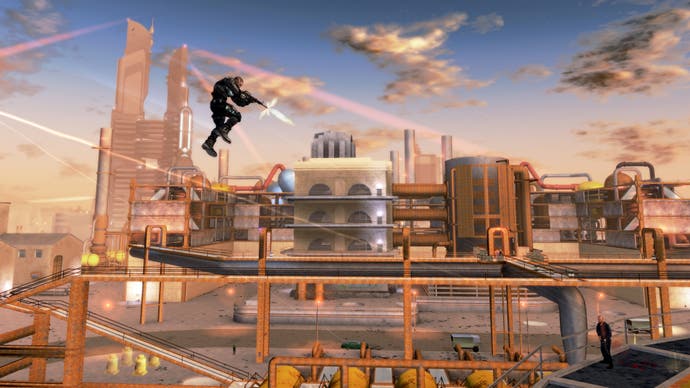The land beyond Achievements
...and Trophies!
If you have prime beachfront property in Pacific City, I have some very bad news: your house is essentially a ramp. If you spend any time in that house, you must know this. You must hear us up there, the distant revving, the overhead thump, the squeal of those thick, juicy SUV tires as they roar past your head.
I can't remember what Achievement I was hunting for when I first discovered that these houses were ramps - the one about doing a certain number of tricks in a certain space of time, the one about doing an entire flip in mid-air - but the detailing is hardly important. The important thing is that I never would have noticed the houses in the first place if I wasn't viewing Crackdown through the lens of Achievements. Achievements were still relatively new in those days - new to me, anyway, as I'd only just picked up a 360. A lot of the time, they were empty busywork or simple route markers: you've finished Chapter 2, you've equipped a rocket launcher. I had plenty of friends who bought games just to rinse them: otherwise intelligent, careful souls who would suddenly have Teenage Mutant Ninja Turtles or that Airbender game showing up on their Gamercards. That must seem like an impossibly wonderful time to makers of today's console games: a strange, twilight era when the promise of virtual numbers could lead to real sales at the cash register. Whatever: this is all pretty well covered. What matters is that a handful of games emerged that started to really understand what Achievements could do. Crackdown is a case in point.
Crackdown - I'm not sure if you've noticed this - is a game with very little plot, very little managed content to use a handy, if slightly grim, term. What it does have, though, is enormous scope for self-expression and screwing around. Beach houses that are actually a stunt park! An SUV that can climb skyscrapers! The problem, though, is how to alert players to the game's real focus. How to reveal its true heart? Those collectable orbs helped, but looking back, it was Achievements that gave you the crucial nudge: Do ten of these? I didn't know you could do one of them! What else can you do?

A good Achievement opens up an otherwise invisible part of the game, in other words: it makes unimaginative players like myself a little more creative. Playing against the rules in games is hardly new, of course. The great games writer Steven Bailey used to call it downtime, I think. But I doubt any players have done quite as much of it as they did in the first half of the last generation, when what could have been the 360's most cynical feature was opening games out and showing their glorious, rangy potential.
Since then, something kind of interesting has happened. For one thing, and maybe I am only speaking for myself, but Achievements really don't seem like a big deal anymore. I remember that people would always ask about them in developer interviews, for example. They don't seem to do that in 2015. Like many things in games, Achievements blossomed quickly and then grew florid - hidden Achievements, viral Achievements, almost impossible Achievements leaving you with a single point added to your Gamerscore. They're still present now, but they don't seem to have the same allure.
I've also just started to notice something new: a world of creativity that now lurks beyond Achievements. This was inevitable, really, but it's still extremely nice to see. After all, if Achievements open out the world of downtime, they also strip away its, well, downtimeyness. Downtime used to be about the crazy, stupid stuff you could do in a game that the designers might not have accounted for. Achievements proved that they had accounted for it, and they were itching to add it to your to-do list. Now, in other words, there's the stuff you really have to do in a game, like completing the campaign and finishing all the side-quests. Then there's the stuff you also really have to do - like 60 tricks in 60 seconds. Finally, there's still that world that lives behind all of that. The world beyond Achievement: the new location of true gaming follies.
A great example of this is one I wrote about a few weeks back: the ghost in GTA 5, a spooky creature who is tricky to find and also, I believe, gives you no Achievements or Trophies when you do. It will add nothing to your Gamerscore, and in the new economy, that makes it all the more valuable. A reminder, then, that there is a part of games that needs to remain truly hidden, a part of the great garden that should always be left to grow wild.

